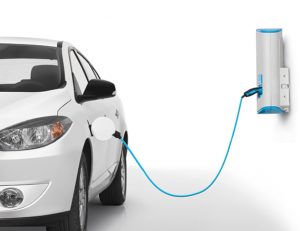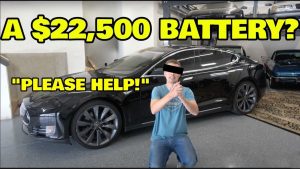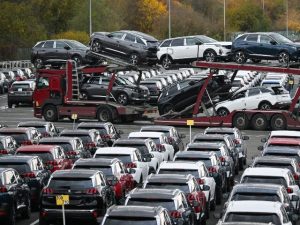Guest Post by Eric Peters

Like a fart that can’t be held in anymore, the truth about battery-powered devices (EVs) is finally being emitted. One of these truths – styled a “hurdle for EV adoption” – is the plummeting resale value of these devices.
How about more than 30 percent in just one year? That’s about five times as much loss in over 12 months as you’d typically lose (about 10 percent) if you bought a vehicle rather than a device. It’s a loss that actually fast – as opposed to how long it takes to charge a device.
This latter accounts, in part, for the plummeting value of devices vs. vehicles. The word has gotten out about the time-cost of devices, including the truth about the lie that you don’t have to wait for the device to charge when you plug it in at home. Of course you do. EV apologists pretend it’s not waiting because you’re waiting at home – or because you’re sleeping while the device is charging. But there’s no getting around the waiting – which will become clear if you need to use the car before it’s done charging.
But the real killer is that devices are dependent upon batteries that inevitably lose their capacity to retain a charge – at which point the device’s value plummets because it doesn’t work anymore and the cost to make it work again (i.e., a new battery) is too high relative to the value of the device itself.
It’s easy to understand how this works.
Everyone who owns a phone or even a laptop already knows how it works. After a few years, the device stops working – unless you keep it plugged in (which means you’re stuck wherever you’re plugged in) because the device’s battery has gotten old and won’t hold charge anymore. By the time this happens, the device itself is already an old device. Electronic devices age much faster than mechanical things, which also don’t need to be the latest things and routinely work for decades and so continue to have value and hold their value for decades.
Most people want to have the latest device – or at least, not an old one that’s lacking all the latest features or that won’t work with the latest updates. So when their old device won’t hold a charge anymore and they find out that it will cost them 50 percent of the rapidly plummeting remaining value of their device to get a new battery for their old device, what do most people do?
They throw the old device away.
That is easy enough to do – financially – with a small battery powered device such as a phone or even a laptop because the cost of a new device isn’t prohibitive.
But it is effectively impossible – financially – for most people who own a large and very expensive device such as an electric vehicle to replace the thing’s battery because most people haven’t got the $15,000-plus it costs to buy a new battery, which they can’t (realistically, most of them) pay for in cash and can’t (also realistically) finance because they’d be putting that $15k on a credit card, at probably double-digit interest, compounded monthly.
So they walk away from the device, which they probably leased (most devices are leased rather than bought because of the high cost of a new device) and leave the dealer that leased it holding the bag. Now the dealer has to eat the cost of the loss, which he can’t recover because most people don’t want a used device, even if it has a new battery. Because it’s still an old device and it will inevitably need a new battery and when it does, by that time, it will be an even older device and probably have lost 70 percent of its original value.
These losses have consequences – including for the cost of leasing a new device, which has become high in proportion to the plummeting residual value of the device by the end of the lease term. It is the projected residual value – i.e., the remaining value of the vehicle after “x” number of years – that is the primary factor affecting how much a lease costs. A device that loses 30-plus percent of its value-when-new after as little as one year is going to cost a commensurately higher amount each month to lease than it would cost to make monthly payments on a vehicle that only loses about 10 percent of its value each year. It will also still be worth something by the time you eventually pay it off – in the event you decided to buy.
“Tumbling resale values aggravate buyers’ worries that an EV isn’t worth the price or the potential headaches, says USA Today. “They already worry about EVs’ high prices, charging, lack of choice, and driving range. Now, they fear when it comes time to sell the vehicle, they’re not going to get much back.”
It’s not a “fear.” It’s a fact.
A related fact is that vertical depreciation negates the device’s supposed “savings” in not having to spend money on gas – and oil/filter changes.
Not surprisingly, people are eschewing devices in favor of vehicles. This is reflected in double-digit declines in the number of devices being bought (and leased). Which has triggered a walking back of the “commitments” made by a number of vehicle manufacturers to make more devices because they’re beginning to realize they can’t force people to buy these devices.
Which brings up an alarming possibility that is likely to become a certainty after the pending selection, if the Orange Man isn’t selected. And perhaps even if he is.
It is that the automakers will demand that EVs be forced on people – not just forced onto the “market” – by forcing vehicles that aren’t devices off the road (and not just out of the showroom). There are a number of ways this could be done, including a massive “carbon tax” on vehicles that aren’t devices – or on the fuel that vehicles need. That is just a matter of the how.
The why is self-evident.
Having poltroonishly (and short-term greedily) bought into the pushing by the government of devices into production for a “market” that doesn’t want these devices, the manufacturers – the car companies – are now hemorrhaging billions on devices and that bleeding has got to be staunched somehow.
The most obvious way to staunch it is to leave people no alternative to the devices they’re pushing.
Bet your bippie it’s coming.





A Mercedes expert at older (pre ’89) on U tube said no one is buying luxury level Mercedes EVs. Simply because to keep one, you will have to drop the entire bottom of the car since it’s a battery to replace it after 10 years. No one will be willing to spend the money. Suggesting Mercedes will become just another EV producer , no differentiation.
VW is starting to backpedal on its EVs, too … and earlier this year they announced that the batteries in their EVs are warranted for only 8 years/99,000 miles …
If something cannot go on for ever, it will stop.
Well, to be honest VW is only “backpedaling” because their unsold new EVs are piling up…
BIL has only found one charging station in his area NW of Chicago. He charges at home and has owned the car for 3 years. I got to drive it. Sweet ride, it’s a Mustang, and he has become well aware of it’s problems, and they will not do long distance travel because of Vax health problems. It works for them, for now.
Just one more thing to add to the “best ever economy”!
Lol! Who can’t relate to that?
Ever have that problem in church? Rather humiliating.
What’s worse is when you only think it’s a fart you’re holding in.
I’ve a Quail Hollow Member good friend that loves his high end Tesla. Only drives it when they migrate from Charlotte to Palmetto Bluff (look it up – $$$$+) to visit his parents during the winter.
Otherwise, they are Lexus people.
I tended bar at a QHCC Christmas party in the ’80s. Nuff said.
I’m going to look into what it cost to make an EV into an ICE vehicle.
May be a boondoggle, may be a boon.
Interesting idea Joe. It’s actually not too hard to turn an ICE vehicle into an EV – it’s been done many times. Turing an EV into a gas burner may be quite difficult. EVs designed as an EV have no place for a transmission, exhaust system, fuel tank, and so forth. As far as I know it hasn’t been done. Your best bet would be an early EV that was originally a gas car, like the very first Tesla – the Roadster. They were based on the Lotus Elise sports car that had a Toyota engine…
Already been done-guy has a shop where he had a Tesla that the company refused to sell him a battery for. He installed a GM engine, trans and rear axle, manufactured a custom exhaust, wiring harness and interior and took it to a SEMA show a while back.
Why not a diesel electric?
Lose the battery, install a compact diesel genset, and keep the electric motors.
Some wiring issues, for sure.
But I’d look at that…
Works for locomotives.
You’ll make a fortune once copper goes to $40 a pound! Think salvage, not conversion.
EV’s will make nice lawn ornaments, and if you take the battery out and properly dispose of it (very expensive), then dump a bunch of them in the water nice reefs for fish to feed on.